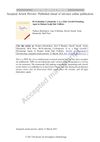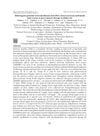 May 2024 in “KIU journal of health science”
May 2024 in “KIU journal of health science” Kolaviron and quercetin may help treat prostate issues.
 April 2021 in “Journal of Investigative Dermatology”
April 2021 in “Journal of Investigative Dermatology” People with atopic dermatitis have more CD4+ T cells that respond to a certain bacterial lipid, which may play a role in the skin condition's inflammation.
 40 citations,
December 2016 in “Journal of Ovarian Research”
40 citations,
December 2016 in “Journal of Ovarian Research” Rutin may help treat symptoms of polycystic ovary syndrome (PCOS) in rats.
 9 citations,
November 2011 in “Cytokine”
9 citations,
November 2011 in “Cytokine” Finasteride helps reduce lung inflammation and damage after trauma and infection.
 1 citations,
November 2018 in “Elsevier eBooks”
1 citations,
November 2018 in “Elsevier eBooks” The document concludes that transplantology has evolved with improved techniques and materials, making transplants more successful and expanding the types of transplants possible.
 9 citations,
December 2013 in “International journal of gynaecology and obstetrics”
9 citations,
December 2013 in “International journal of gynaecology and obstetrics” Polycystic ovary syndrome (PCOS) is a major health issue for women in Egypt, affecting 14% of fertile women and 37.5% of infertile women.
 January 2023 in “Biomedicine & Pharmacotherapy”
January 2023 in “Biomedicine & Pharmacotherapy” Low oxygen conditions improve how well certain stem cells from embryos can make hair grow longer and faster.
 242 citations,
February 2016 in “Science”
242 citations,
February 2016 in “Science” Hair loss and aging are caused by the breakdown of a key protein in hair stem cells.
170 citations,
May 1979 in “The journal of pediatrics/The Journal of pediatrics” Two sisters with rickets and hair loss had a genetic issue with vitamin D processing, and only improved when given phosphorus supplements.
 2 citations,
March 2021 in “Molecular Immunology”
2 citations,
March 2021 in “Molecular Immunology” Dermal macrophages might help regrow hair.
 1 citations,
April 2016 in “CRC Press eBooks”
1 citations,
April 2016 in “CRC Press eBooks” Skin aging reflects overall body aging and can indicate internal health conditions.
 179 citations,
April 2012 in “Nature Communications”
179 citations,
April 2012 in “Nature Communications” Regenerated fully functional hair follicles using stem cells, with potential for hair regrowth therapy.
 8 citations,
January 2007 in “Hair transplant forum international”
8 citations,
January 2007 in “Hair transplant forum international” Vitamin B12 improves the health and growth of hair micrografts.
4 citations,
October 2016 in “The journal of investigative dermatology/Journal of investigative dermatology” Using an anti-ICAM-1 antibody with rapamycin improves hair transplant survival in monkeys.
6 citations,
February 2021 in “Frontiers in Neurology” Cyclosporine-A can cause serious blood clots in the brain, so patients need careful monitoring.
New treatments for alopecia areata, like JAK inhibitors and immunomodulators, are promising.
 22 citations,
July 2019 in “PLOS ONE”
22 citations,
July 2019 in “PLOS ONE” Skin lymphatic vessels are essential for hair growth.
 9 citations,
April 2019 in “Biomolecules & Therapeutics”
9 citations,
April 2019 in “Biomolecules & Therapeutics” Udenafil may help hair grow by activating certain stem cells.
 5 citations,
January 2009 in “Dermato-endocrinology”
5 citations,
January 2009 in “Dermato-endocrinology” ADAM 10 and ADAM 12 proteins are involved in different stages of hair growth and could be targets for treating hair disorders.
19 citations,
March 2021 in “Experimental and Therapeutic Medicine” Isotretinoin can cause serious birth defects and needs careful use, especially in pregnant women.
14 citations,
April 2021 in “International journal of molecular sciences” Mesenchymal stem cells may help treat hair loss by improving hair cell growth and reducing inflammation.
 24 citations,
June 2018 in “Reviews in endocrine and metabolic disorders”
24 citations,
June 2018 in “Reviews in endocrine and metabolic disorders” Thyroid diseases may contribute to autoimmune skin diseases, and more research is needed on their relationship.
 January 2022 in “Stem cell biology and regenerative medicine”
January 2022 in “Stem cell biology and regenerative medicine” New biofabrication technologies could lead to treatments for hair loss.
 25 citations,
May 2018 in “Clinical & Translational Oncology”
25 citations,
May 2018 in “Clinical & Translational Oncology” New melanoma treatments can cause skin side effects, including skin cancer and rashes, but combining treatments may reduce these risks.
 40 citations,
January 2009 in “Skin Pharmacology and Physiology”
40 citations,
January 2009 in “Skin Pharmacology and Physiology” Fetal cells could improve skin repair with minimal scarring and are a potential ready-to-use solution for tissue engineering.
 29 citations,
March 2015 in “Journal of Investigative Dermatology”
29 citations,
March 2015 in “Journal of Investigative Dermatology” Cyclosporine A promotes hair growth and prolongs the active growth phase in human hair follicles, but may work differently than in rodents.
 80 citations,
April 2018 in “Trends in Molecular Medicine”
80 citations,
April 2018 in “Trends in Molecular Medicine” Lichen Planopilaris and Frontal Fibrosing Alopecia may help us understand hair follicle stem cell disorders and suggest new treatments.
 54 citations,
January 2013 in “BMC Complementary and Alternative Medicine”
54 citations,
January 2013 in “BMC Complementary and Alternative Medicine” Thuja orientalis hot water extract may help hair grow by starting the growth phase and improving hair follicle development.
 24 citations,
December 2014 in “International Journal of Molecular Medicine”
24 citations,
December 2014 in “International Journal of Molecular Medicine” Eclipta alba extract helps increase hair growth and decrease hair loss-related protein in mice.
 December 2020 in “Nigerian journal of animal production”
December 2020 in “Nigerian journal of animal production” Dexamethasone can cause diabetes in rats, and Annona muricata bark extract may help lower blood sugar.
























